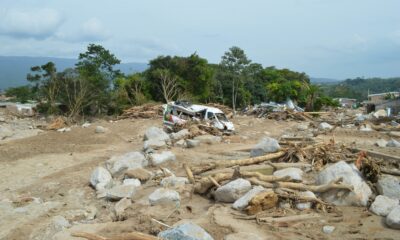News
South Africa Declares GBV a National Disaster as Women Demand Action

South Africa Finally Declares GBV a National Disaster, But Will It Spark Real Change?
A country on edge pushes government to act as women’s organisations, farmworkers, students, community groups and unions unite in outrage.
For years, gender-based violence (GBV) has been South Africa’s silent pandemic, deadlier than many of the crises that have dominated headlines, yet somehow never treated with the urgency it so clearly demands. But that changed this week.
After months of mounting pressure, nationwide protests and a rallying cry that echoed from small rural towns to city streets, government has finally classified gender-based violence and femicide (GBVF) as a national disaster.
The announcement landed just hours before world leaders arrived for the G20 Summitforcing the crisis squarely onto the global stage.
A Nation That Refused to Stay Silent
The final push came from Women for Change, which led the massive Women’s Shutdown on 21 November. Streets filled with women wearing black, placards reading “Stop Killing Us” and “Not One More”, while social media timelines flooded with stories of trauma, rage and exhaustion.
For many protesters, this wasn’t just activismit was survival.
The pressure worked. Minister of Cooperative Governance Velenkosini Hlabisa confirmed that the National Disaster Management Centre (NDMC), led by Dr Bongani Elias Sithole, invoked Section 23 of the Disaster Management Act and formally classified GBVF as a disaster.
“The violence against women poses persistent and immediate life-safety risks,” Hlabisa said.
“It now meets the threshold of a potential disaster.”
South Africa didn’t wake up to a new problem. It simply stopped pretending it wasn’t one.
What the Disaster Classification Actually Means
Despite the dramatic title, this classification does not trigger emergency powers. Instead, it forces all levels of government, national, provincial and municipalto coordinate their response more aggressively.
It activates obligations under the Disaster Management Act, compelling government to:
-
Strengthen GBV response structures
-
Activate contingency plans
-
Improve coordination between policing, health, justice, education and social development
-
Expand programmes like Thuthuzela Care Centres
-
Strengthen sexual offences courts
-
Report progress to the NDMC under Section 24
It also reinforces ongoing initiatives such as:
-
The Inter-Ministerial Committee on GBVF
-
NATJOINTS Priority Committee
-
The 90-Day GBVF Acceleration Programme
-
Reforms in the criminal justice system
For the first time, GBVF is being treated not as a social issue, but as a multi-sector disaster impacting life, safety, economics and national stability.
‘Not a Women’s Issue, a National Crisis’
The phrasing was deliberate. Hlabisa, Ramaphosa and civic groups highlighted the same point:
GBV is not a “women-only” issue. It is a crisis that affects the entire country.
President Cyril Ramaphosa, speaking in Boksburg after receiving recommendations from the G20 Social Summit, sounded more candid than usual:
“Women are crying out for protection and supportfrom their government and from the men of South Africa.
We must now treat gender-based violence and femicide as a crisis.”
His words came after survivors and activists repeatedly accused government of ignoring their pleas, especially as a woman is murdered every 2.5 hours in South Africa.
Protests Extend Beyond GBV Alone
While GBV was the central focus, several groups, including Operation Dudula and smaller civic organisationsplanned parallel demonstrations during the G20 Summit.
Operation Dudula leader Zandile Dabula said their protest would be peaceful and aimed at highlighting poverty and unemploymentissues activists say fuel GBV and create conditions where women feel trapped in abusive households.
Cultural and Historical Context: Why This Moment Matters
South Africa has long been described as having one of the highest rates of GBV in the worlda tragic legacy tied to:
-
Apartheid’s violent patriarchal structures
-
Generational trauma
-
Deep economic inequality
-
Hyper-masculinity shaped by militarised policing and migrant labour systems
-
Weak social protection systems
-
Chronic underfunding of shelters
Communities have criticised the state for years, claiming GBV plans were “beautiful on paper but powerless in practice”. The national disaster classification marks the first time government has acknowledged GBV as a structural, systemic emergency, not a set of isolated crimes.
Public Reaction: Relief, Skepticism, and ‘We’ve Heard This Before’
Online, the mood was mixed.
On X/Twitter:
-
Some expressed relief that government finally listened.
-
Others warned that symbolic declarations mean nothing without arrests, convictions and safe shelters.
-
Survivors said they were tired of promises and wanted real accountability, especially for police who mishandle cases.
On Facebook community groups:
-
Rural women raised concerns about slow response times from SAPS and lack of victim-friendly services.
-
Many asked whether funding would finally be ring-fenced for shelters, especially in areas like Central Karoo and Vredendal where none exist.
Across platforms, one sentiment dominated:
“This is overdue, now prove it matters.”
Will This Turn the Tide?
The government insists the classification will help integrate existing efforts and strengthen coordination. But South Africans have grown wary.
The biggest question remains: Will this actually save lives?
Declaring a national disaster is a historic step, but unless the systems around policing, justice, social development, health and education shift in meaningful ways, the crisis will continue unchecked.
Still, activists say the classification offers something rare in the GBV space:
leverage.
Now, the public can demand measurable progress and government has no room to hide behind bureaucratic excuses.
For now, the country waits. And watches.
The disaster classification isn’t a victory, but it is a turning point, a recognition that South Africa must confront its most painful truth with honesty and urgency.
And if Friday’s protests proved anything, it’s this:
South African women will not stop fighting until real change comes.
Follow Joburg ETC on Facebook, Twitter , TikTok and Instagram
For more News in Johannesburg, visit joburgetc.com



























